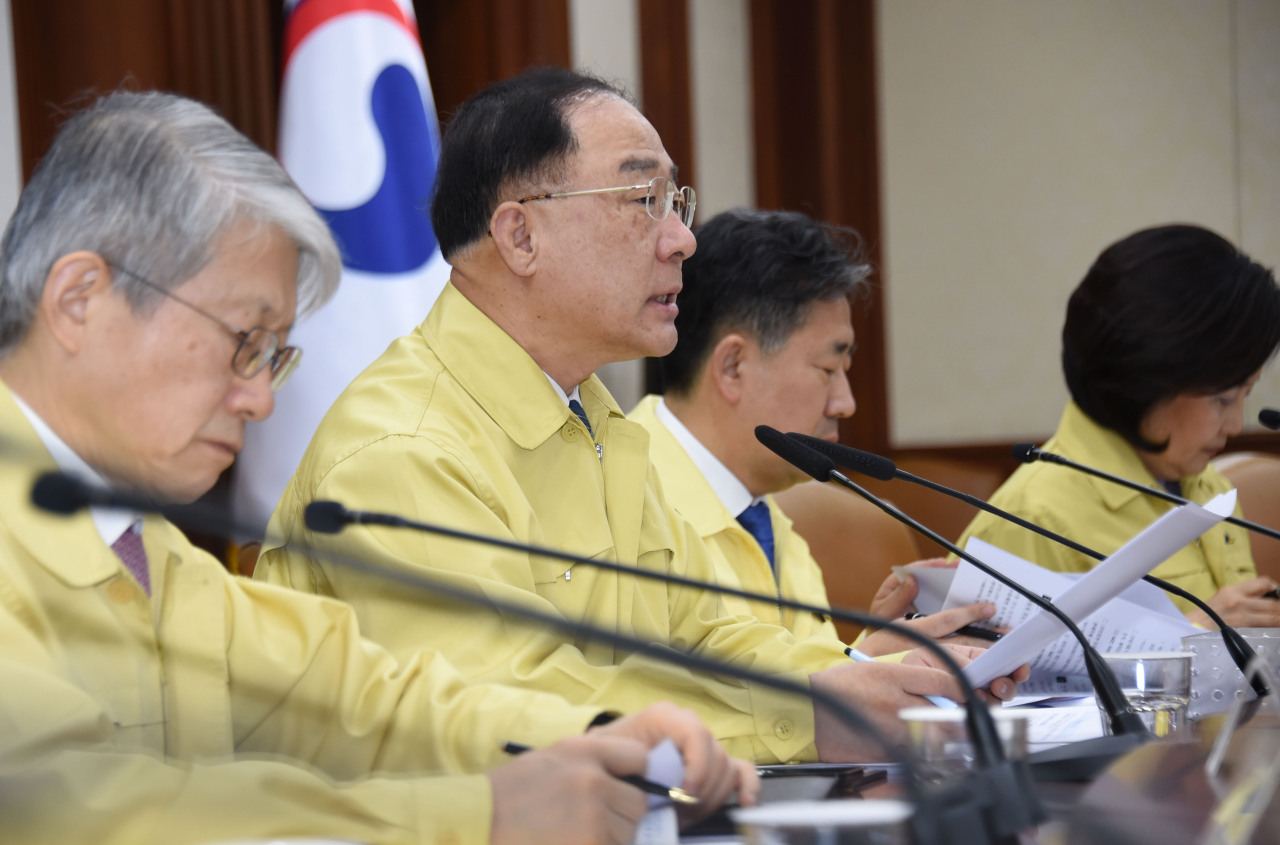 |
(Yonhap) |
The South Korean government is injecting some 50 billion won ($40.4 million) to help the virus-hit transport industry here, by exempting fees and delaying payment to cover the businesses’ losses caused by a sharp drop in passengers.
In a meeting for crisis management measures presided by the country’s deputy Prime Minister and Finance Minister Hong Nam-ki on Wednesday, the government confirmed a set of measures to support industries hit by the coronavirus outbreak, primarily transport businesses including the aviation industry.
“Entry restrictions (on South Koreans) in other countries and a sharp drop in passengers and cargo volumes have severely damaged aviation, bus and marine transportation businesses,” Hong said.
As of Wednesday, a total of 150 countries announced an entry restriction or ban on travelers from South Korea.
The government expects the number of passengers to and from Korea to further drop on-year by 4.98 million in the first half of the year, bringing at least 6.3 trillion won of losses to air carriers.
The government said it would exempt air carriers’ form charges for stationing their planes at parking ramps at all airports in the country – the total amount coming to 7.9 billion won.
From June, the government will exempt air carriers’ landing fees at airports. It will also exempt international air carriers’ from charges for using airport’s safety facilities for three months, equivalent to a total of 12 billion won.
Payment for using aircraft maintenance area will be delayed until May with no interest, while the cost of it will be reduced by 20 percent at Incheon International Airport and 10 percent at Gimpo International and other regional airports.
To allow more aircraft to be safely stationed inside the parking ramp, up to 489 aircraft stands at parking ramps will be prepared at domestic airports, the government said.
The government is also delaying withdrawal of the air carriers’ international traffic rights and distributed slots.
Air carriers including Korean Air have been citing massive cost burdens to meet the criteria to secure rights and slots.
To retain traffic rights, an air carrier must use them 20 weeks annually, using at least 50 percent of its airspace passage rights. At least 80 percent of slots must be filled with service as well.
But based on Article 17 of the Aviation Business Act, the transport minister can cancel the withdrawal of such rights in emergency situations including a war, a closure of the airport or over security issues.
The government said it would also prepare to resume service of aviation sector in April, by asking for cooperation to countries that announced entry restrictions of South Koreans.
As for cross-region buses, the government will exempt highway tolls for one month, which amounts to some 8 billion won.
Authorities said they are also reviewing measures to allow bus operators to reduce operation of bus routes that have seen over 50 percent reduction in the passenger number.
The government said it will also suggest local governments to set up extra budget to support local bus operators for citizens’ convenient transportation and urge them to use cost for disinfection in advance.
For marine transportation sector, the government said it would support three local shipping companies and two car ferry companies with 2 billion won-worth of loans with 2 percent interest rate and a one-year maturity.
It is also exempting 100 percent of rent fee of commercial complexes at Busan International Passenger Terminal to help support 17 business operators there.
By Kim Da-sol (
ddd@heraldcorp.com)





![[Exclusive] Hyundai Mobis eyes closer ties with BYD](http://res.heraldm.com/phpwas/restmb_idxmake.php?idx=644&simg=/content/image/2024/11/25/20241125050044_0.jpg)
![[Herald Review] 'Gangnam B-Side' combines social realism with masterful suspense, performance](http://res.heraldm.com/phpwas/restmb_idxmake.php?idx=644&simg=/content/image/2024/11/25/20241125050072_0.jpg)

